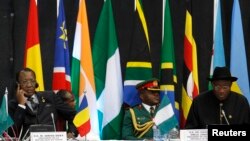Boko Haram, the insurgency in northern Mali, and the crisis in the Central African Republic. One thing unites these three conflicts: the country of Chad. This large, central African nation is becoming something of a regional power.
Earlier this month, protesters belonging to the #bringbackourgirls group, which is pushing for the release of the more than 200 schoolgirls abducted by the Nigerian Islamist extremist group Boko Haram earlier this year, marched on an unusual target: the embassy of Chad.
Poor, and with a long history of wars and coups, Chad recently has been playing an outsized role in west and central African affairs.
A short-lived cease-fire between the Islamist group and Nigeria’s government was brokered in Chad's capital N’Djamena. The country lies close to territory that Boko Haram has effectively taken over both in Nigeria and in Cameroon. Yet, the group never seems to bother attacking Chad.
Growing suspicion
All these factors have led to a growing feeling of suspicion in Nigeria. Many feel Chad is not doing enough to fight off the Islamist group, or worse, is somehow cooperating with the insurgents.
Ryan Cummings is chief Africa analyst at red24, a South Africa-based crisis management firm, who has also written on Chad’s geopolitics.
“There’s the perception within Nigeria that its neighbors are not doing enough to aid the country in combating Boko Haram, when it's become quite apparent that Boko Haram is not just a Nigeria-specific problem,” he said.
That might be a deliberate calculation on Boko Haram’s part, Cummings said. Chad is something of a military power. Between 2000 and 2009, Chad under President Idriss Déby raised military spending by 663 percent. Much of that money came from newly tapped oil reserves.
Cummings said the country has one of the best militaries in the region. Its troops are part of the United Nations peacekeeping mission in northern Mali, and were controversially deployed to the Central African Republic, where rights groups accused them of committing atrocities and taking sides in the country’s ethno-religious conflict.
Cummings said Deby’s focus on military supremacy is an attempt to preserve his own position, which he came into via a military coup.
“It makes sense that he needs to keep the military happy, he needs to keep them on his side, because the minute there are divisions within the country’s armed forces, and the minute there’s a perception that the military in itself as a benefactor of state patronage might be better off under a different type of government or possibly ruling the country itself, then Deby’s hold onto power obviously comes under significant threat, I should say,” said Cummings.
Stable ally
Foreign powers like the United States and France see Chad as an ally. France has a military base in the capital N’Djamena, while the U.S. has deployed drones to the capital to look for the Chibok girls, and plans to hold military exercises in the country next year.
Given the weak and sometime antagonistic governments elsewhere in Africa’s Sahel region, Cummings said these countries see Chad as a pillar of stability, even though its regime has been accused of human rights abuses like using child soldiers and carrying out massacres in the C.A.R.
“Through all of this, Chad has been the one country that has continued to be subject to stability, and where foreign intervention could almost be coordinated from Chadian territory and where Chadian forces themselves could play quite a good role in trying to, at the very least, bring some form of stability to neighboring countries,” said Cummings.
That same stability hasn’t translated to nearby northern Cameroon or northeast Nigeria. Both countries’ militaries have struggled against Boko Haram’s advances.
That the group has posed few problems for Chad means that suspicion of the country likely will continue.




